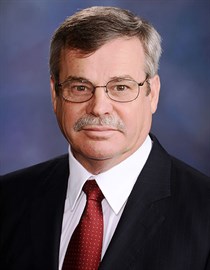 Dr. A. Dan Hill made a presentation on behalf of the Society of Petroleum Engineers (SPE) during a working group dinner convened on the first night of the World Economic Forum (WEF) in Davos, Switzerland on Jan. 19. Hill, the head of the Harold Vance Department of Petroleum Engineering at Texas A&M University, was speaking on the subject of a global model curriculum for petroleum engineering.
Dr. A. Dan Hill made a presentation on behalf of the Society of Petroleum Engineers (SPE) during a working group dinner convened on the first night of the World Economic Forum (WEF) in Davos, Switzerland on Jan. 19. Hill, the head of the Harold Vance Department of Petroleum Engineering at Texas A&M University, was speaking on the subject of a global model curriculum for petroleum engineering.
Hill, who also serves as the Director of Academia on the SPE Board of Directors, was approached by SPE to develop such a model after SPE was contacted by Bob Dudley, CEO of BP and the head of the WEF oil and gas working group. The working group, composed of many high level members of the oil and gas industry, expressed its concern that the educational variance of petroleum studies around the world was detrimental to establishing critical basic skills. Hill introduced the idea of a model curriculum to all the dinner attendees, but stressed in his speech that such a curriculum must be flexible.
“This cannot be a case of one curriculum fits all,” Hill said. “What works at Texas A&M is not going to work at Stanford or at Marietta College, and not at the University of Lagos. It cannot be universal, but the model can be flexible, so that’s what we’ll be formulating in SPE.”
The current plan is for Hill to coordinate an effort through his SPE advisory committee to provide a model curriculum. Once SPE and the oil and gas working group are satisfied with it, the information can be shared internationally through the web as a guide for schools everywhere.
“This is not about accreditations or ABET,” said Hill. “It’s not about U.S. programs. This is about improving education in developing places around the world where oil and gas activities are perhaps just starting but where the education system hasn’t really caught up.”
The WEF annual meeting in Davos convened approximately 2,000 CEO’s and political leaders from around the world. These meetings are founded on the idea that this is a fast-paced and interconnected world, where breakthrough technologies, demographic shifts and political transformations have far-reaching societal and economic consequences. The WEF members feel leaders need to share insights and innovations on how best to navigate the future.
The oil and gas working group Hill gave his speech to represents only one facet of the WEF program and the group’s members were interested in more than just petroleum engineering education. Once the SPE model is developed, the group has further plans.
“Their interest is not just furthering petroleum engineering education but also all of the disciplines that are so critical to the oil and gas industry,” said Hill. “They are using SPE to provide this model, using petroleum engineering first, and then they will perhaps do something along the same lines for geology, geophysics and other related sciences.”